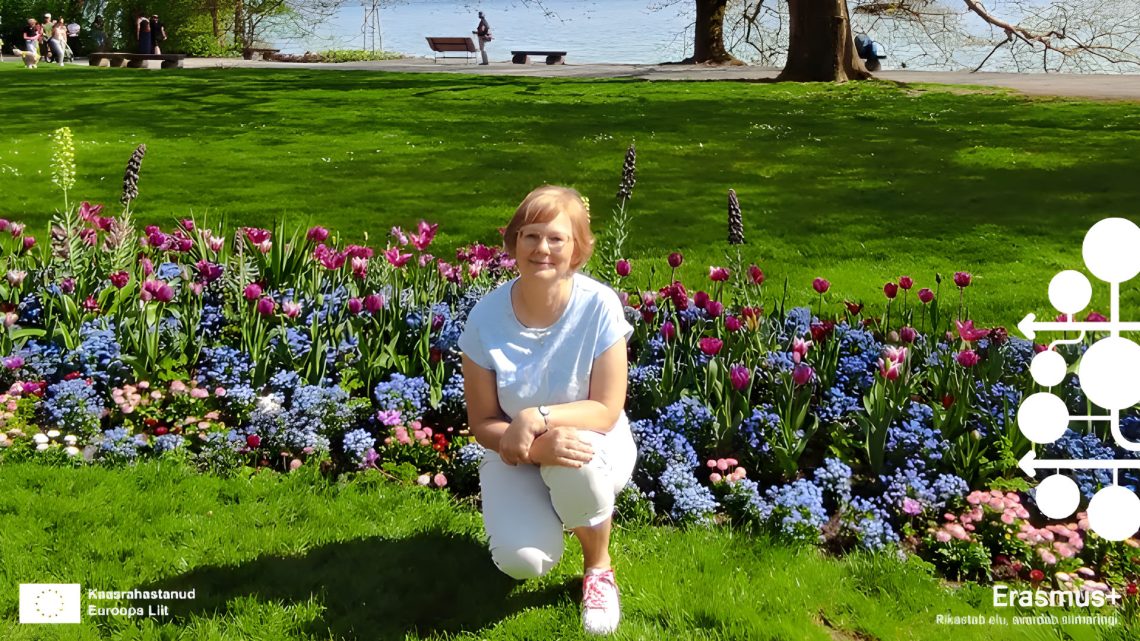Learning German at Lake Constance – Erasmus+ makes teacher’s eyes shine4. June 2024 by Humboldt-Institut

As part of an Erasmus+ study trip, German teacher Katrin Vaikmaa from Estonia spent a week as a guest student at the Humboldt-Institut in Constance. In the Humboldt Blog, she reports on her experiences in class and during the leisure activities.
Why did I choose this small language school in the south of Germany near the Swiss border for my study abroad program?
I’ve traveled a lot in Germany, but the area around Lake Constance was yet an undiscovered corner for me. In German-language textbooks, there are often topics about cultural studies, i.e. the geography and culture of Germany. I’ve often read the text about Lake Constance from the A1 textbook “Themen aktuell” with my students, but I’ve never been there myself!
I also wanted to get to know new colleagues and get ideas for methods and teaching materials. I was most interested in how the students’ oral expression skills develop and how more complex grammatical topics are explained.
To keep it short: All my questions and needs were answered. As soon as I arrived, an individual lesson plan was drawn up for me and I was offered the opportunity to take part in leisure activities. But first we had something to eat.
The Constance language school of the Humboldt-Institut very much works like a boarding school. Many of the students stay longer, they live, study, eat and sleep in the same building.
The students are mainly young adults from all over the world, but older students are also welcome. During my time, there were students from the USA, Italy, Taiwan, Japan, Slovakia, Ukraine, China and Italian-speaking Switzerland in Constance.
All in all, it’s a big family that learns and lives happily together. As the school is small, everyone’s successes, worries and joys are shared and you sit together with the teachers and the head teacher at the dining table. Only German is spoken in the school building. As the students have different mother tongues, it couldn’t be otherwise.
Being in a foreign language environment contributes significantly to language learning. Students are also encouraged to express themselves during class in any way they can. As the groups are small, everyone gets a chance to speak.
In the courses I have attended, everyone has been actively involved. A lot of work is done in groups and with partners, and tables are rearranged in no time. The teacher walks around, sets the topic, and helps if needed. The topic is later discussed together and the students correct the typical mistakes that the teacher has noticed.
In order to guess the new topic in class, some pictures were distributed. While walking through the class in pairs, the pictures had to be completed with words or expressions that came to mind. Naturally, students from different backgrounds had different ideas and vocabulary. They were discussed in detail and a new topic was also addressed.
In the B1 and B2 courses, new vocabulary was written on the blackboard in German and their meaning was explained in detail and at length. In addition to the teacher, the students also took part in this excercise.
A lot of time is spent on learning grammar every day, as students have to take a weekly test at the end of each week. Those who wish can also take a telc exam or the TestDaF. Learning grammar is classical and a bit theoretical. It seemed to me that sometimes it could be easier. But everything is practiced a lot. I was able to use my pedagogical skills in partner work and my fellow students were very grateful. Every day there are five to seven lessons. Homework is given and also checked.
On the very first day, I saw familiar textbooks in the staff room. I use the new textbooks from Klett-Verlag at Multilingua and I also knew many of the exercises from the Internet. It was nice to feel that we were on the right track with our German colleagues and working towards the same goal.
Students have numerous opportunities to spend their free time in Constance. They can participate in seventy different sports activities at the University of Constance or take part in various excursions and trips.
German is always spoken at these events. I myself took part in a cycling tour to the island of Reichenau. Two young ladies from Lithuania and Hungary accompanied the boarding school life and the evening activities. Their job was to keep the students company in their free time.
We also took a city tour of Constance and an excursion to the island of Mainau. The latter exceeded all expectations: the spring blossom was in full swing on the island and made my heart beat faster.
I supplemented my work shadowing program with a rich cultural program in Munich and also visited Switzerland. A chance meeting and dinner with one of Germany’s best-known crime writers, Eva Almstädt, was very interesting.
All in all, it was a great experience that I can recommend to any teacher! I am very grateful to the Humboldt-Institut where I was warmly welcomed as the first Erasmus+ participant. I was able to take part in the courses and activities every day. When I left the school, it really warmed my heart. Students and teachers stopped, waved at the door and gave me lots of good wishes!
The author of the blog post, Katrin Vaikmaa, is a German teacher at Multilingua language school in the Estonian capital Tallinn.

